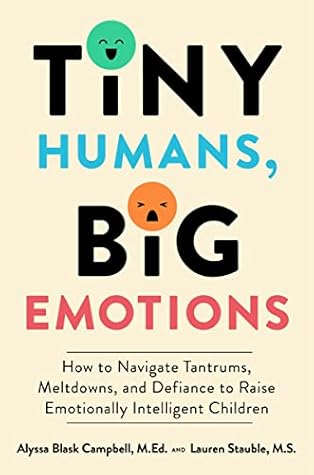More on this book
Community
Kindle Notes & Highlights
Started reading
June 2, 2025
Our parents’ generation just didn’t have access to the brain science and emotion science that we do today. Parenting in the ’80s still meant teaching “resilience” by not making a big deal out of emotions. Phrases such as “turn it off” or “just ignore them” were meant with good intentions to strengthen us. Since the ’90s, we’ve learned that emotional intelligence skills are connected to success in relationships and at work.
In this world, we are raising compassionate, confident, loving children who mature into adults who can count on one another to lead and to follow intelligently, respect personal boundaries and simultaneously reach out to those who are isolated, and acknowledge their mistakes and celebrate their strengths. This shared vision further ignited our drive to do this work.
That means what is appropriate to say and do at home is usually different from what is appropriate at school, synagogue, the grocery store, or your grandparents’ house in the country where your dad was born.
As generations have evolved, we’ve learned more about how to keep children safe in cars, and the car seat has evolved along with our knowledge. In years to come, I’m sure today’s children will look back at photos of their rudimentary car seats (which seem absolutely cutting edge today) and feel just as flabbergasted as I did staring at that photo of mine. At least, I hope they do. I hope we learn more. I hope we continue to evolve, grow, and change. Not just in the car seats we use, but in all areas of life. As we learn more, I hope our practices change in response to that knowledge.
The point of this story is twofold. First, it’s that each generation does their best with the knowledge and resources they have. Second, it’s that the way our loving, nurturing parents raised us—cutting edge as it may have been at the time—may be absolutely out of step with the latest science and research on child development.
change can be hard, especially with something like parenting, where so much of the way we interact with children is hardwired from the way we were raised.
We form the basis for how they will show up in relationships with others. One day, they will open their mouth and our voice will come out, and damn, that’s a lot of pressure.
One day, I hope our children grow up and tell us about the things they’ve learned and ways they are working to do things differently. You aren’t failing if you aren’t perfect. You’re human. Your mess is welcome here.
We believe that every parent wants to be the best parent for their child, and no one is meant to navigate this journey alone.
as long as we help our kids feel safe, seen, and soothed most of the time, their brains wire to securely know that if they have a need, we will see it and show up for them. And when we do that predictably (not perfectly), they learn how to find friends and mates who will show up for them (they come to expect it!), and they learn how to show up for themselves.”4
What would it look like to ask ourselves, “Am I proud of me?” or “Am I a good parent according to me?”
can trigger feelings of shame and embarrassment. Those feelings have the potential to override logic, especially if these are painful feelings for you, and then other feelings can swoop in to “protect” you from the more painful ones.
Anger and frustration are common protector feelings and unfortunately easy to dump on a child. When the adult doesn’t know how to process their feelings, it can be scary for the child. They perceive it as being unlovable. If you’re dependent on others and you think you’re unlovable to them, it’s a threat to your safety.
How can we teach social skills without transferring our embarrassment, our own shame, our own legacy burdens onto the child?
are so good at jumping into the future. Our brains are designed to do so, to try and prevent hard things from happening, to keep us safe.


